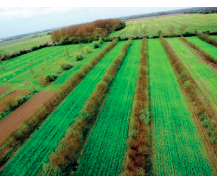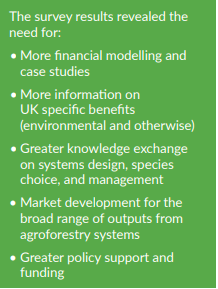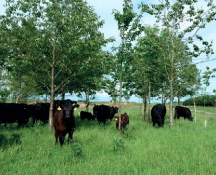Written by the Soil Association
A survey of 346 people interested in agroforestry reveals much greater support, information and payment certainty are needed for farmers and land managers to implement agroforestry in the UK. Planting trees on farms can boost farm productivity by 30%[i] and bring a range of benefits including improved soil health, carbon capture, biodiversity and animal welfare. It would also support Government tree planting targets.
Respondents were asked to complete the survey after downloading the free Agroforestry Handbook, produced in collaboration with the Soil Association and the Farm Woodland Forum to help farmers decide which trees and systems are best for their farms. The handbook gave most farmers more confidence to implement agroforestry, with over 75% of respondents more likely to implement agroforestry on their farms after reading the guide. Respondents’ most common motivations were increased biodiversity, landscape resilience, and farm resilience.

However, despite strong interest in the benefits of agroforestry for farms and the environment, the survey found significant barriers holding development back, including a lack of technical knowledge and uncertainty around support payments. Around 40% of respondents did not know where to go for further guidance on agroforestry, with many others finding that the information they need from government simply does not exist.
Ben Raskin, Head of Horticulture and Agroforestry at the Soil Association, said;
“The UK is amongst the least wooded countries in Europe – with only 13% of the UK under trees compared to 38% on average in Europe. Planting more trees on farms can be a win-win for climate, nature and health and would support the huge ambition of the Government’s National Tree Strategy. The UK is already well behind on our Government’s own targets and there’s been other issues, like the potential impacts on wildlife. It’s critical for nature and climate that the right trees are grown in the right places.
It seems a no brainer for UK government to provide a supportive policy framework and more clarity on payments in order to increase the uptake of agroforestry. Tree planting can and must play a vital role in a green recovery – tapping into the strong appetite for agroforestry could support more resilient farming, and help restore nature, health and a safe climate.”

Dr Tim Pagella, Lecturer in Forestry at Bangor University and co-author of the Agroforestry Handbook, said:
“Agroforestry is a new name for an ancient practice. Trees have potential to play a critical role as we move towards more sustainable and ‘climate smart’ food systems. Careful integration of the right trees onto our farms can improve soil and animal health, create diversification opportunities, enhance biodiversity, reduce inputs and deliver public goods in our rural landscapes.”

Survey respondent and Woodland Consultant, David Cracknell, said:
“One silver lining of Brexit should be that we can now shape our own domestic agricultural grants scheme so that we pay farmers to plant trees on their livestock farms – to improve soil, carbon storage, livestock well-being, productivity and the environment as a whole. With the right political will we could really lead on agroforestry in this country. We have the expertise.”
The handbook also highlights opportunities for UK farmers to reduce farm inputs and replace imports with tree products such as fruit, nuts, fence post timber, animal bedding, fuel wood and mulches. Research by French think tank IDDRI has shown that in Europe a ten-year transition to agroecological farming practices – like agroforestry – would slash agricultural greenhouse gas emissions by 40%, help to restore biodiversity and protect natural resources – all while producing enough healthy food for Europe’s growing population.
